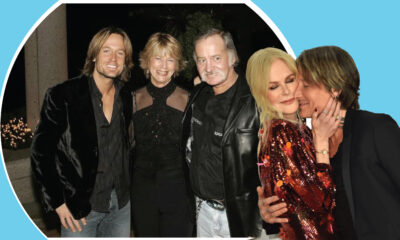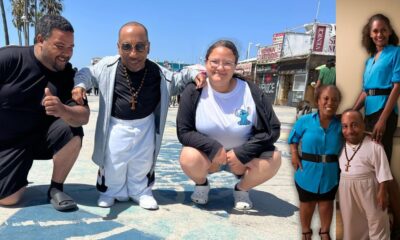Education
A Guide to Hyphenation: Does ‘In Person’ Have a Hyphen?

- /home/u433845138/domains/buzzark.co.uk/public_html/wp-content/plugins/mvp-social-buttons/mvp-social-buttons.php on line 27
https://buzzark.co.uk/wp-content/uploads/2025/02/iStock-531466918_hyphen-edit-1000x600.jpg&description=A Guide to Hyphenation: Does ‘In Person’ Have a Hyphen?', 'pinterestShare', 'width=750,height=350'); return false;" title="Pin This Post">
- Share
- Tweet /home/u433845138/domains/buzzark.co.uk/public_html/wp-content/plugins/mvp-social-buttons/mvp-social-buttons.php on line 72
https://buzzark.co.uk/wp-content/uploads/2025/02/iStock-531466918_hyphen-edit-1000x600.jpg&description=A Guide to Hyphenation: Does ‘In Person’ Have a Hyphen?', 'pinterestShare', 'width=750,height=350'); return false;" title="Pin This Post">
Hyphenation can be tricky, especially when it comes to common phrases that are often written in different ways.
One phrase that frequently raises questions is “in person,” and many wonder does in person have a hyphen? The answer largely depends on how the phrase is used in your sentence.
Understanding when to hyphenate can help make your writing more precise and easier to read.
In this guide, we’ll clarify when and why “in person” should or should not include a hyphen, offering clear examples to ensure you get it right.
Understanding Hyphenation Rules
Hyphens are primarily used to join words or parts of words together. They serve as connectors in compound words, making sure that the reader understands the relationship between the words.
Whether it’s joining a compound adjective, separating syllables, or clarifying meaning, hyphens are necessary for correct and effective communication.
When Should You Use Hyphens?
There are specific situations when hyphens should be used. Here are the main rules for hyphenating:
- Compound Adjectives Before Nouns: When two or more words act as a single modifier before a noun, they should be hyphenated.
- Example: Well-known author, Long-term solution
- Numbers and Fractions: Hyphens are used when numbers or fractions are spelled out.
- Example: Twenty-three books, One-third of the population
- Avoiding Ambiguity: Use hyphens to clarify meaning in compound words.
- Example: Small-business owner (without the hyphen, it could be interpreted as a small owner of a business)
- Prefixes and Suffixes: Use hyphens with certain prefixes and suffixes when they help in understanding or prevent awkward letter combinations.
- Example: Un-American, Ex-husband
These rules are generally straightforward, but when it comes to words like “in person,” the decision is less clear.
Does ‘In Person’ Have a Hyphen?
The main question is: does in person have a hyphen? The answer depends on its use in the sentence.
1. Hyphenate ‘In-Person’ When it’s a Compound Modifier
When “in-person” appears before a noun and functions as a compound adjective, it is hyphenated. This helps clarify that the two words are working together to describe the noun.
For example:
- In-person meeting: Here, “in-person” modifies “meeting,” explaining that the meeting will take place physically.
- In-person interview: Again, “in-person” modifies “interview,” showing that it’s happening face-to-face rather than virtually.
In both examples, the hyphen is necessary to show that “in-person” describes the type of meeting or interview.
2. Do Not Hyphenate ‘In Person’ After the Noun
When “in person” is used after a noun, it is not hyphenated. This is because the phrase is no longer acting as a compound modifier; instead, it’s a prepositional phrase.
For example:
- The meeting will be in person: Here, “in person” comes after the noun “meeting” and doesn’t require a hyphen.
- I met her in person: Similarly, “in person” describes the manner of the meeting but is not hyphenated.
In these cases, there is no need for a hyphen since “in person” functions as a phrase, not a compound modifier.
Why Does Hyphenation Matter?
Correct hyphenation makes your writing clearer and more professional. It helps readers understand the meaning of phrases and prevents any confusion. If the wrong words are joined or left separate, readers might misinterpret your message.
For example:
- She is a small business owner: Without a hyphen, this could imply that the business itself is small.
- She is a small-business owner: With the hyphen, it’s clear that the person owns a small business.
Hyphenation is essential not only for understanding but also for maintaining credibility in your writing. Proper use of hyphens shows that you care about the details and want your ideas to be communicated effectively.
Common Hyphenation Mistakes
Even the most experienced writers can make hyphenation mistakes. Here are some common errors to avoid:
1. Using a Hyphen in Adverbs Ending in “ly”
Adverbs ending in “ly” do not need a hyphen when modifying an adjective or another adverb.
Example:
- A highly qualified professional (no hyphen needed)
- A wonderfully written book (no hyphen needed)
2. Using Double Hyphens
Using two hyphens in a compound modifier is incorrect. Double hyphenation can confuse readers and lead to awkward sentence structures.
For example:
- A high-school level exam is correct.
- A high–school level exam is incorrect.
3. Overuse of Hyphens in Well-Known Terms
Some compound words are already established in their non-hyphenated form. For instance, terms like “real estate” and “post office” don’t need hyphens.
For example:
- Real estate agent (no hyphen needed)
- Post office (no hyphen needed)
It’s essential to be aware of these exceptions and avoid unnecessary hyphenation.
Helpful Tips for Hyphenating Correctly
To make sure you’re hyphenating words correctly, here are a few tips:
- Is it a compound adjective before a noun? If yes, use a hyphen.
- Example: In-person seminar
- Is the compound adjective acting after a noun? If no, leave the hyphen out.
- Example: The seminar will be in person
- Is the compound modifier part of a well-known term or phrase? If yes, do not use a hyphen.
- Example: Real estate market, Post office
By remembering these simple rules, you can master hyphenation in no time.
Examples of Hyphenation in Context
To further clarify the rules, let’s look at more examples:
- In-Person
- In-person meeting with the manager tomorrow.
- In-person conference will be held next week.
- In Person
- We’ll meet in person for lunch.
- He prefers doing business in person rather than over the phone.
In these examples, you can see that the hyphen is used when “in-person” modifies the noun, and it is left out when “in person” is used after the noun.
Conclusion
Hyphenation may seem like a small detail, but it plays a critical role in clear writing. Understanding does in person have a hyphen is just one part of mastering this important punctuation mark. By using hyphens when appropriate, you can enhance readability and avoid misunderstandings. Hyphenating compound modifiers before nouns is essential for clarity, while leaving them out after the noun is perfectly acceptable. With a bit of practice and attention to detail, you can confidently navigate the world of hyphenation and improve your writing overall.
-

 Celebrity11 months ago
Celebrity11 months agoMichael C. Hall: Complex Journey of a Versatile Actor
-

 Business10 months ago
Business10 months agoUnderstanding Apostille UK: A Comprehensive Guide
-

 Technology11 months ago
Technology11 months agoThe Future of Video Marketing: Trends You Can’t Ignore
-

 Celebrity12 months ago
Celebrity12 months agoShane Urban Explained: Facts About Keith Urban’s Sibling
-

 Celebrity12 months ago
Celebrity12 months agoAnuel AA Height and Weight? Everything Age, Bio, Family, and More
-

 Celebrity12 months ago
Celebrity12 months agoWho is Heidi Berry Henderson? Everything About Halle Berry’s Sister
-

 Celebrity12 months ago
Celebrity12 months agoThe Life of Lorenzo Luaces: Lili Estefan’s Ex-Husband Explained
-

 Celebrity1 year ago
Celebrity1 year agoOtelia Cox, Bio Tony Cox’s Wife, Her Age, Height, and Life Journey
-

 Celebrity12 months ago
Celebrity12 months agoian cylenz lee: Bio, net worth, age, family and more Kandyse McClure’s husband
-

 Entertainment1 year ago
Entertainment1 year agoEverything About ‘Oche Oche Anasico’ Lyrics: Meaning, Origin & More
-

 Celebrity12 months ago
Celebrity12 months agoWho is Carolin Bacic? A Deep Dive into Steve Bacic’s Wife
-

 Fashion10 months ago
Fashion10 months agoThe Perfect Pairing: Corset Prom Dresses for a Flattering Fit and Beaver Hat Blanks for Timeless Style


